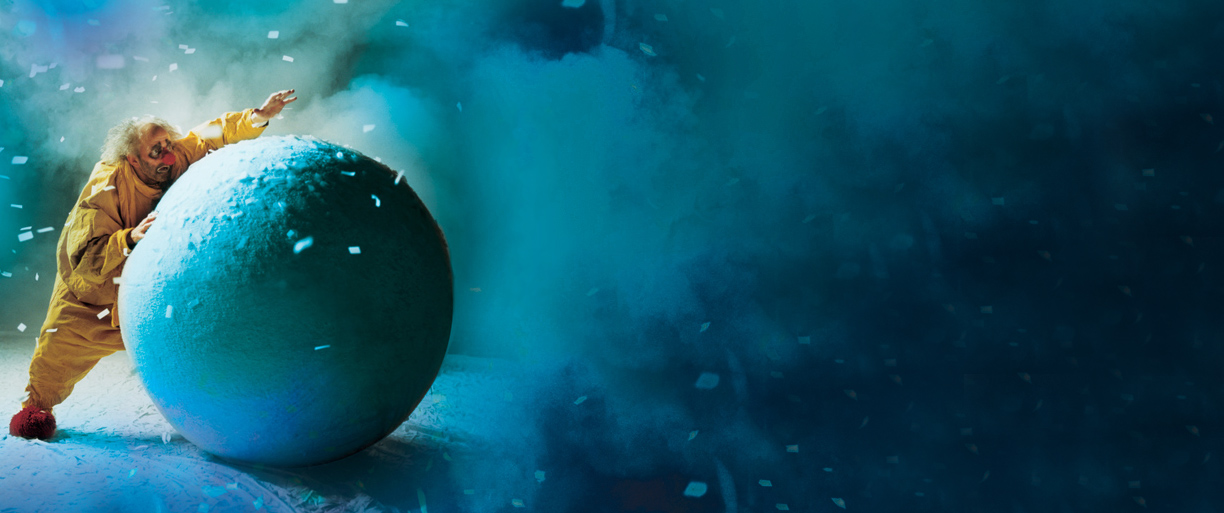Slava Polunin’s Snow Show
Tickets are available at the boxoffice of the Mikhailovsky Theatre (cash only) and on the website .
Tickets for the show are not subject to return or exchange.
Stage Director: Victor Kramer
Designer: Victor Plotnikov
His eccentric pantomime, which he lovingly dubbed “Expressive Idiotism”, brought him enormous popularity. It also crowned him an artist laureate of Estrada, the Russian showbiz stage. There wasn’t a single concert of note in which the double-act Polunin-Skorzov didn’t play a part. Only a year went by and Polunin’s famous clown, Asisyai, was born: a humorous and touching figure in a yellow boiler suit and red fluffy slippers. This thoughtful, gentle, poetic character came into the world drawing on the poetic sadness of Leonid Engibarov’s clownery, the refined philosophising of Marcel Marceau’s pantomime, and the humanity and comic poignancy of great Chaplin’s films. All of these Polunin considers his major teachers.
Asisyai first appeared before an audience of millions of television viewers in the new year’s edition of “Light Blue Flame” in1980-1981, in a sketch with two oversized inflatable telephones. Here for the first time was heard his dialogue on love, on loneliness, on the longing for human understanding, on the bliss of discovery and the bitterness of loss, which to this day accompanies Polunin’s hero — and the clown himself — to his audiences in the most diverse corners of our planet. Originally Asisyai was many-faced and multi-facetted: he could be gentle and naive, but ironic the next minute, or puffed up in full-blown conviction, emitting his invincible “Zya!”.
Natasha Tabachnikova
I dreamt that there is no such thing as postmodernism, but only the primacy of feeling, an ancient purity of emotion. The touch of fine fingers on a spot-lit balloon in the dark... And — look — the balloon has flown away! Slava the clown weeps. With forbidding whistle, he sternly orders it back; with gentle persuasion, he beseeches the escapee to return; he blisters and boils with rage, then whistles out his longing. And the balloon drifts back, bulging a fat yellow smile, dangling its rosy little thread by his side, and then! — explodes in his arms. The poor baggy sod in red slippers — he couldn’t withstand the momentary bliss of his sudden repossession... What poetic mime! The rhythm of its verse is such, that all are free to interpret, which means, to co-create... [That last gesture, for example: surely it depends upon the space in which you are evolving, or, in which you are deteriorating...]
It wounds the heart. But bitter, too, is sweet life. And sweet it was for me — and not for me alone — in that packed-out theatre-hall, as an enormous spiderweb descended upon us just before the intermission. For in that glassy fibre’s thread everyone gasped for joy — joy that we had been entangled, that finally someone needed us. And we didn’t go to drink and smoke, but sat in anticipation of that true happiness that even the intermission seemed to promise. And in reward for our expectations, an even thicker snow began to fall. Children aged 10 to 65 contrived to make snowballs, showering one another with snow in glee. Yet for this spontaneous happiness their could be no reproach: it was innocent. And the tears had not yet dried, the salty drops not yet trickled to our lips that stretched in smiles from ear to ear, before again we began to cry, and again, and once more, anew...
Ekaterina Vasenina
Tickets for the show are not subject to return or exchange.
Stage Director: Victor Kramer
Designer: Victor Plotnikov
Slava
They call him “the best clown in the world”. His Snow Show is celebrated as “a theatre classic of the 20th century” (The Times, London). Recognition came unusually early for Slava Polunin, and from that moment on, his fame was unstoppable. This is probably because Slava doesn’t do things “just like that”. Everything in his life is very well considered, very finely weighed — even the most crazy, the most incredible, the most adventurous of feats. In achieving his aims, he is concrete, collected and imperturbable.His eccentric pantomime, which he lovingly dubbed “Expressive Idiotism”, brought him enormous popularity. It also crowned him an artist laureate of Estrada, the Russian showbiz stage. There wasn’t a single concert of note in which the double-act Polunin-Skorzov didn’t play a part. Only a year went by and Polunin’s famous clown, Asisyai, was born: a humorous and touching figure in a yellow boiler suit and red fluffy slippers. This thoughtful, gentle, poetic character came into the world drawing on the poetic sadness of Leonid Engibarov’s clownery, the refined philosophising of Marcel Marceau’s pantomime, and the humanity and comic poignancy of great Chaplin’s films. All of these Polunin considers his major teachers.
Asisyai first appeared before an audience of millions of television viewers in the new year’s edition of “Light Blue Flame” in
Natasha Tabachnikova
A Dream on a Winter’s Eve
It was a dream. <...> Snow covered the entire floor, all the chairs, and all those who sat in them. A marvelous dream it was. Well-disposed oligarchs and icy pop stars in tuxes smiled in beguilement, even dropping themselves into the gathering snowdrifts. Suddenly a wind began to blow, hard as only hurricanes know, and music to deafen one’s ears to sepulchral silence. Fear gripped us in anticipation of what was to come. But the lights came up — and out shuffled a clown with small, meditative Kabuki-theatre steps: a figure in vastly-oversized yellow overalls and red fluffy slippers. A rope in his hands coiled into a noose, then — slipping like rosaries through his fingers — framed his face in portrait, became a leash, then a jump-rope, and then an Alpinist’s life-line... a hawser from which a friend — one of a clan of buffoons in hats with helicopter-blade ear-flaps and ski-esque elongated booties — dragged himself out...I dreamt that there is no such thing as postmodernism, but only the primacy of feeling, an ancient purity of emotion. The touch of fine fingers on a spot-lit balloon in the dark... And — look — the balloon has flown away! Slava the clown weeps. With forbidding whistle, he sternly orders it back; with gentle persuasion, he beseeches the escapee to return; he blisters and boils with rage, then whistles out his longing. And the balloon drifts back, bulging a fat yellow smile, dangling its rosy little thread by his side, and then! — explodes in his arms. The poor baggy sod in red slippers — he couldn’t withstand the momentary bliss of his sudden repossession... What poetic mime! The rhythm of its verse is such, that all are free to interpret, which means, to co-create... [That last gesture, for example: surely it depends upon the space in which you are evolving, or, in which you are deteriorating...]
It wounds the heart. But bitter, too, is sweet life. And sweet it was for me — and not for me alone — in that packed-out theatre-hall, as an enormous spiderweb descended upon us just before the intermission. For in that glassy fibre’s thread everyone gasped for joy — joy that we had been entangled, that finally someone needed us. And we didn’t go to drink and smoke, but sat in anticipation of that true happiness that even the intermission seemed to promise. And in reward for our expectations, an even thicker snow began to fall. Children aged 10 to 65 contrived to make snowballs, showering one another with snow in glee. Yet for this spontaneous happiness their could be no reproach: it was innocent. And the tears had not yet dried, the salty drops not yet trickled to our lips that stretched in smiles from ear to ear, before again we began to cry, and again, and once more, anew...
Ekaterina Vasenina



